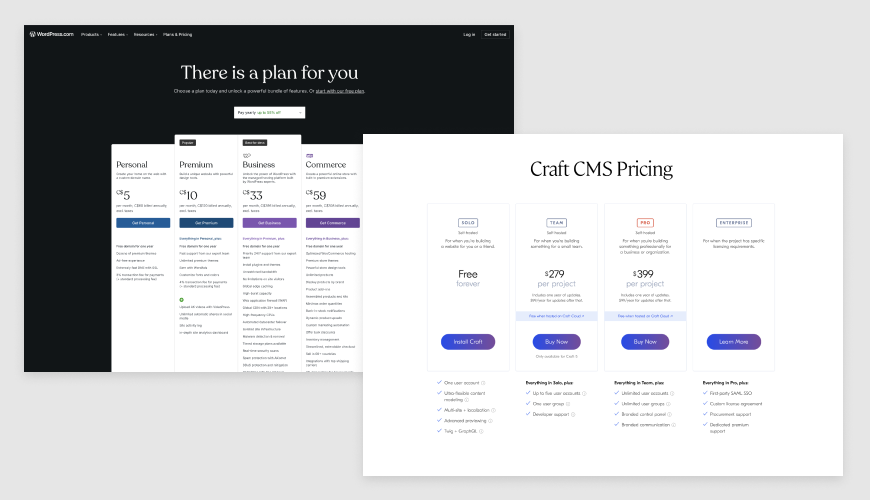
A recent post on the Craft CMS website presents a thorough comparison between Craft CMS and WordPress. We’d like to take this opportunity to simplify the comparison for our audience, making it easier to understand the differences and benefits of each platform. The link is available below if you’re interested in reading the original post in full detail. This breakdown offers valuable insights for those looking to make an informed decision about the suitable CMS for their business. When choosing a CMS for a modern website, the decision often narrows down to Craft CMS vs. WordPress. Both platforms have their strengths, but they cater to different needs. Understanding which suits your goals can help you create a more secure, scalable, and efficient website. In this post, we’ll break down the key differences between Craft CMS and WordPress to help you make an informed choice for your business.
1. Flexibility and Customization
Craft CMS is known for its high level of flexibility, making it an ideal solution for businesses that require custom-built websites. It offers developers the freedom to create a fully bespoke site without relying heavily on third-party plugins. This is particularly valuable for businesses with unique or complex requirements, as it ensures the site can be tailored to specific functionality and workflows.
WordPress, on the other hand, is easier to set up out of the box, with thousands of themes and plugins available for immediate use. However, its reliance on plugins can become a downside for businesses with specialized needs. Many WordPress themes and plugins are built for general use, which can limit customization or require significant modifications to fit your business’s needs. If your business is looking for a completely tailored solution, Craft CMS offers more freedom without the need for bloated plugins.
2. Security and Stability

Security is critical for businesses, especially for e-commerce and data-heavy websites. Craft CMS takes security very seriously, providing a more secure and reliable foundation out of the box. Since it’s a less common CMS than WordPress, Craft CMS sites are less frequently targeted by hackers. Furthermore, Craft does not rely on many third-party plugins, reducing the risk of vulnerabilities arising from poorly maintained or outdated plugins.
WordPress, the most popular CMS globally, is a frequent attack target. Many WordPress sites require plugins for additional functionality, and those plugins can open up vulnerabilities, especially if they are not kept up to date. While WordPress can be secure, maintaining that security often requires constant monitoring, updates, and attention to plugins.
3. Ease of Use
Both platforms have user-friendly interfaces but differ in how they cater to different types of users. WordPress is generally considered easier for beginners. Its large library of themes and plugins means non-developers can quickly set up a website with minimal technical expertise. For small businesses or bloggers looking for an easy-to-use platform with many free tools, WordPress is often the go-to choice.
While slightly more complex to set up initially, Craft CMS offers a highly intuitive control panel for content management once it’s configured. The structure is clean and customizable, making it easier for marketing teams and content managers to organize and manage content continuously. Craft CMS provides more flexibility in the long run for businesses that need a CMS focused on scalability and content control.
4. Performance and Scalability
Performance is another area in which Craft CMS excels. Craft CMS is designed to be lightweight and efficient, providing fast load times and responsive user experiences. This makes it an excellent choice for businesses that expect to grow their site over time and need a scalable solution. The clean codebase allows developers to optimize the site’s performance based on the business's specific needs.
WordPress can also be optimized for performance but often requires extra plugins and technical expertise. As WordPress sites grow and more plugins are added, they can become slower and more challenging to manage. Craft CMS provides a more streamlined, scalable solution for businesses expecting significant growth or complex site requirements.
5. Cost and Maintenance

The cost structure between Craft CMS and WordPress also differs significantly. Craft CMS is a paid platform with a licensing fee for the CMS and potential costs associated with custom development. However, these costs are often offset by the need for fewer plugins and the lower long-term maintenance required.
WordPress is free, but many businesses pay for premium themes, plugins, and ongoing maintenance. Additionally, the cost of maintaining security, updating plugins, and optimizing performance can add up over time, especially for larger, more complex websites.
6. Support and Community
Both platforms offer strong communities, but they serve different purposes. WordPress has an enormous community with thousands of developers, designers, and plugin creators. This makes finding support, tutorials, and add-ons relatively easy. However, the quality of third-party plugins and themes can vary significantly.
While Craft CMS has a smaller community, it has a highly dedicated and responsive developer base. The support is robust, and Craft provides high-quality documentation and premium customer support options. For businesses that value direct support from experts, Craft CMS offers more personalized assistance.
Conclusion: Which CMS is Right for You?
Craft CMS is often the better choice for businesses that need a highly flexible, scalable, and secure platform. It provides a tailored solution for complex sites without heavy reliance on third-party plugins. However, WordPress remains a strong contender for small businesses or users seeking an easy-to-set-up, cost-effective solution with a wide variety of pre-built themes and plugins.
When deciding which platform is right for you, consider your long-term goals, security needs, and whether you need a custom-built solution. Craft CMS may be the ideal choice for businesses prioritizing control, flexibility, and long-term scalability.
For more details, read the complete comparison at Craft CMS vs WordPress.








